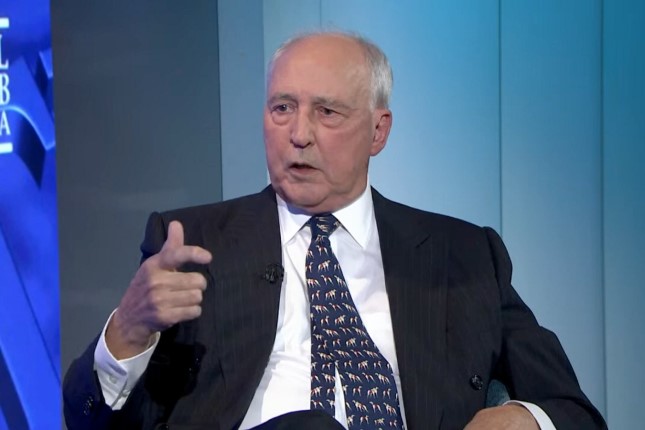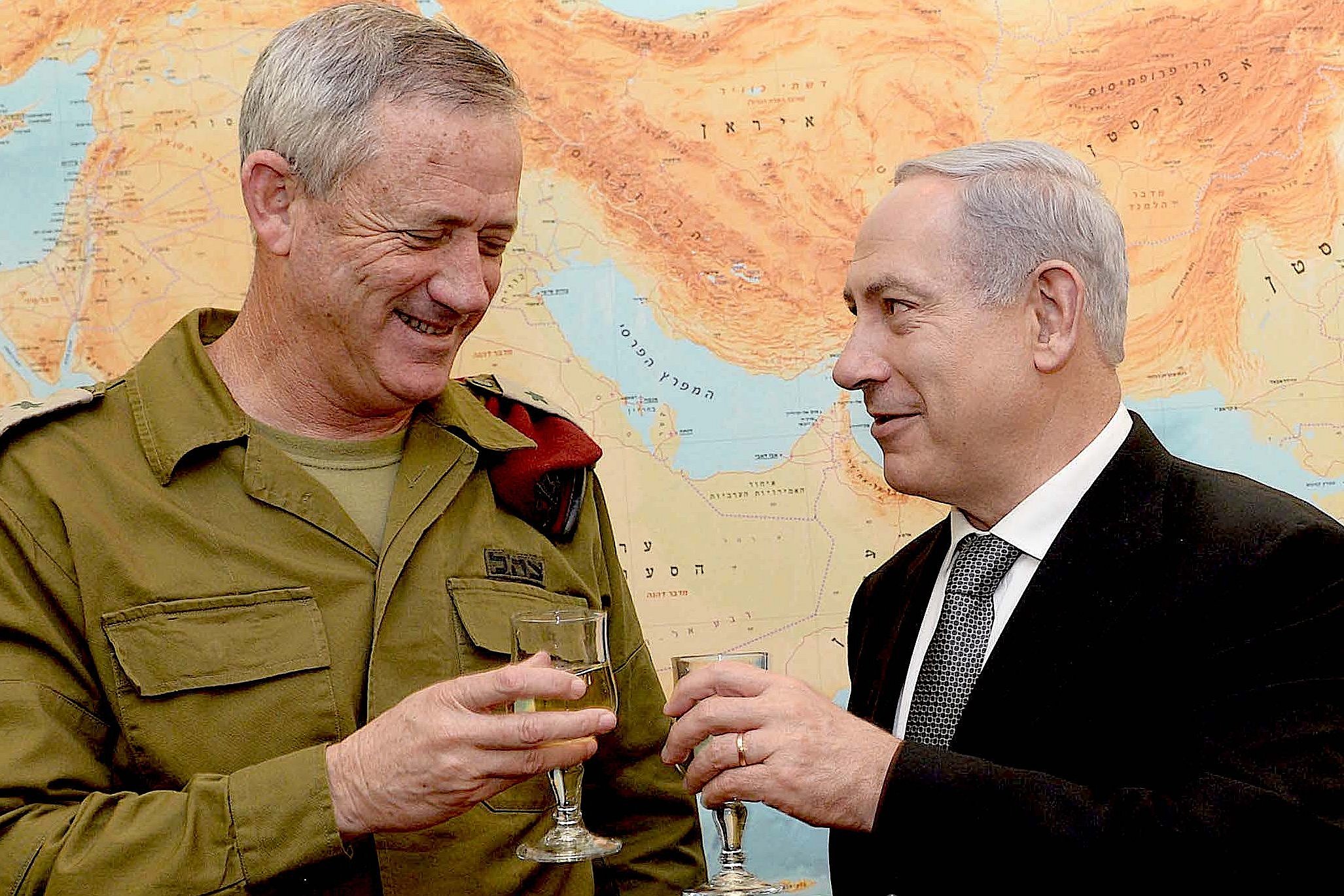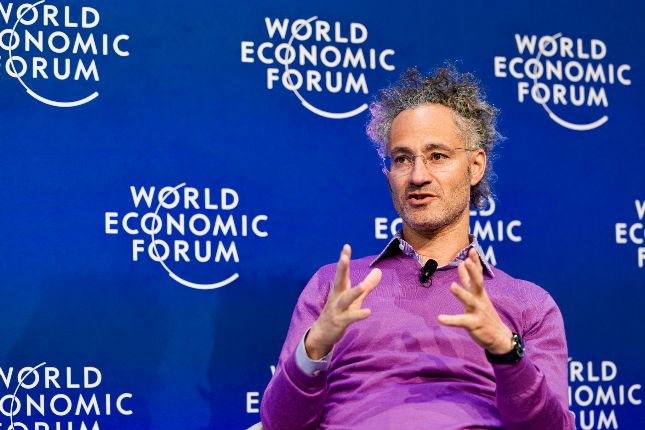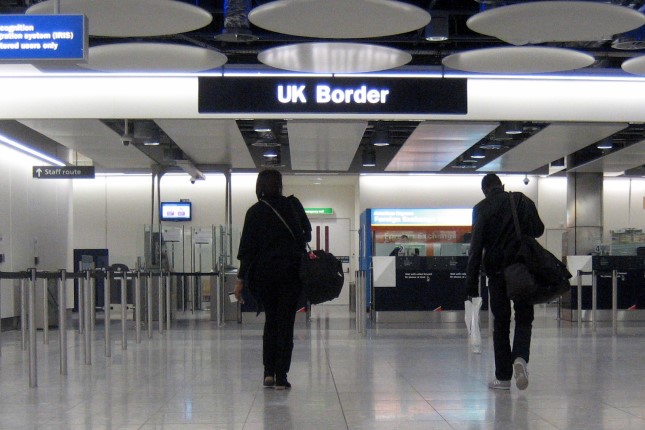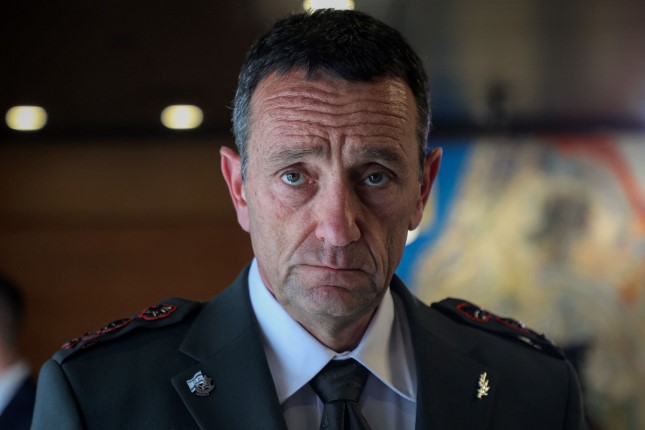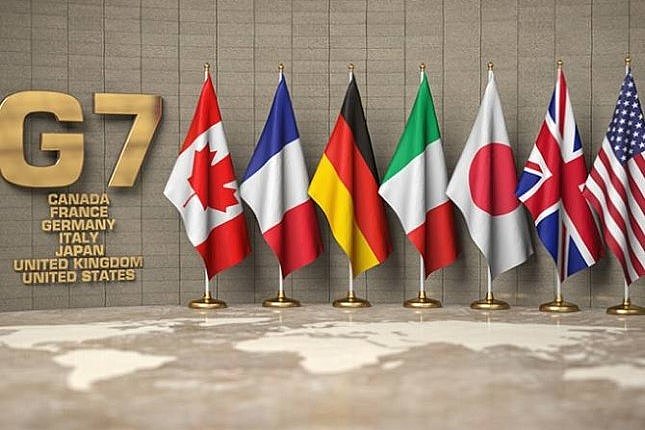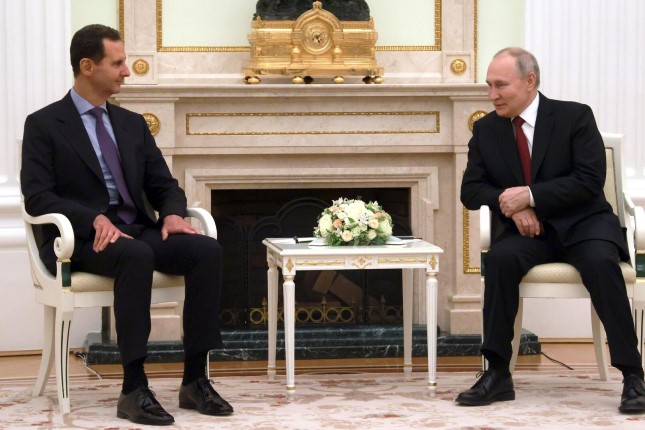Keating sharply rejected claims that Australia’s acquisition of the submarines had anything to do with repelling “Chinese aggression.” Instead, the advanced crafts were being purchased to conduct offensive operations throughout the Indo-Pacific, including near the Chinese coastline.
Underscoring the historic implications of the AUKUS announcement, Keating described it as the last link in the chain of a full-scale US military encirclement of China aimed at preparing for war.
The event with Keating was held the day after Australian Prime Minister Anthony Albanese stood alongside his British counterpart Rishi Sunak and US President Joe Biden to announce the agreement.
Australia will purchase between three and five US Virginia-class nuclear-powered submarines off the shelf in the early 2030s. Later in the decade, it will assist in the manufacture of a new fleet of six to eight subs, based on the British Astute design but fitted with American military technology. Far sooner than either of these initiatives, however, Australia will host a growing number of British and US nuclear-powered subs.
Keating, who was Labor prime minister from 1991 to 1996, remains a prominent political personality. He is a right-wing figure directly implicated in Australia’s participation in criminal US-led wars and military interventions.
Keating is not criticising AUKUS, the militarist pact between Australia, Britain and the US, from the standpoint of opposition to war or imperialism. Instead, he speaks for a minority wing of the ruling elite itself, which is fearful of the disastrous consequences for Australian capitalism of participating in a full-blown war with China, its largest trading partner.
Keating’s remarks, however, have struck a broader chord, because they are a rare exception to near universal support for the US alliance and each new step of a military build-up within the political and media establishment. He spoke certain basic truths, which are generally all but forbidden in official discussion.
Whereas it is always asserted that the US and its allies, such as Australia, are responding to Chinese “threats” and a purported military build-up by Beijing, Keating pointed to the real dynamic. China had committed the “mortal sin” of having “grown as large as the United States” economically.
The US wished to remain the “primary strategic power” in East Asia. To that end, “Its geostrategic priority is to contain China economically and militarily.”
Keating lambasted claims that China posed a military threat to the US or Australia. The US was protected by “two vast oceans.” To invade Australia, the Chinese would need to launch an armada that would be wiped out on the more than 6,000-kilometre journey between the two countries. The US, moreover, remained the world’s preeminent military power.
And China, Keating noted, had no such ambitions for offensive military operations. He cited the US Defence Department’s 2022 annual report to Congress, which said that Beijing’s only military aim was to “restrict the US from having a presence on China’s periphery.” Or, as Keating spelled out, Beijing wishes that the US and its allies would cease provocative military operations and patrols off the Chinese coastline.
The former PM drew the obvious parallel of how the US would respond to similar actions. “Imagine how the US would react if the Chinese blue water navy did its sightseeing off the coast of California,” he said. “The US would be in a state of apoplexy.”
In his most significant and disturbing comments, Keating pointed to the real purpose of Australia’s acquisition of the submarines. This is widely known in strategic circles, but generally hidden from the population. They are, he said, “Designed to attack in China’s peripheral waters.” In a war crisis, the submarines would sit off China’s coastal shelf, in preparation for an all out military conflict.
The implications of such a war would be catastrophic, rapidly engulfing the entire Indo-Pacific region, and likely the world. Almost inevitably, nuclear weapons would be involved.
But the Australian press corps has been transformed, almost to a man, into propagandists for just such a disastrous war aimed at maintaining American imperialist hegemony. No less striking than Keating’s remarks was the response.
A conga line of journalists, from every major publication, queued up to challenge the former prime minister with the talking points of the US and Australian governments and their intelligence agencies.
Their lying remarks were duly despatched by Keating. The exchanges frequently descended into farce. One insisted that China was a strategic threat to Australia. When Keating demanded to know how this threat manifested itself, the reporter pointed to Chinese trade tariffs on Australian products such as lobsters and wine. Keating noted that Australia and the US had instituted their own trade sanctions against China and suggested that such measures were not grounds for war.
Matthew Knott of the Sydney Morning Herald demanded to know whether Keating would have sharp words for the Chinese Communist Party and its oppression of the Uighur people, as he did for journalists and the Australian government.
Keating noted that Knott was coauthor last week of the Sydney Morning Herald’s “Red Alert” series. It purported to be an independent examination of Australian foreign policy, based on the statements of five experts. But all of them were affiliated with the government or hawkish think tanks funded by the US, Australia and major arms dealers.
“Red Alert” declared that Australia needed to prepare for war with China within three years. It demanded the stationing of US nuclear weapons in northern Australia and the imposition of mass conscription.
Keating replied by denouncing “Red Alert” as the most “biased” and “egregious presentation” he had ever seen and by telling Knott to “do the right thing and drum yourself out of Australian journalism.” Keating noted that the extent of the persecution of the Uighurs was “contested.” The Australian media, moreover, was entirely indifferent to the Indian government’s attacks on Muslim citizens, because India is aligned with the war drive against China.
The condemnation of Knott, and Keating’s description of “Red Alert’s” co-author Peter Hartcher as a “psychopath” who has fanned the flames of war for years, have drawn widespread condemnations from the official media. The Sydney Morning Herald’s editor Bevan Shields yesterday published an opinion piece describing “Red Alert” as “proud journalism” and condemning Keating’s remarks as “unfair.”
In effect, calls for nuclear war are permissible. Heated denunciations of such warmongering are impolite and even beyond the pale.
Other publications have referred to Keating as a “relic.” His basic position, that Australia should not join the US in a disastrous war with China, has been presented as an expression of idiosyncrasy verging on senility. Albanese and other Labor government ministers have rejected Keating’s statements out of hand, without responding to their substance.
This only goes to show how fully aligned the Australian political and media establishment has become with the US war drive against China. It is also a preemptive strike against any broader questioning of AUKUS, under conditions where the ruling elite is well aware that there is mass hostility to war among workers and young people who have until now been kept entirely in the dark about the dangers they face.
The response to Keating also demonstrates that the minority wing of the ruling elite, which warns against full Australian commitment to a US war against China, is increasingly marginalised.
This layer, and Keating himself, offer no way forward in the fight against war. Keating’s remarks were suffused with Australian nationalism. He repeatedly denounced the submarine deal, because the $368 billion spend is subsidising British and US arms manufacturers, Keating says to the detriment of the Australian state.
Keating and others of his view have pointed to the weakening of American imperialism. He said that the US could create a military catastrophe in the Indo-Pacific, and then “walk away,” as it had from Afghanistan. This wing is effectively warning that the US is not in a position to wage a successful war against China.
Keating’s own proposals were militarist and hawkish. The former PM said that the AUKUS spend could have been used to build a fleet of 40-50 diesel-powered Collins-class submarines that would patrol the Australian coast. His and Bob Hawke’s Labor governments participated in US-led wars and interventions, including the first Gulf War. They carried out various neo-colonial activities in the Pacific region, aimed at advancing Australian imperialism’s interests.
Keating is fearful that war with China will threaten those interests. In his remarks, he noted the opposition of Indonesia and other southeast Asian states to AUKUS.
Finally, as an astute politician, Keating is well aware that the Labor government risks provoking a mass anti-war movement. That was the significance of his description of the nuclear submarines decision as the worst international policy adopted by a Labor government since the attempt to introduce conscription in World War I. That move resulted in a split within the Labor Party and massive opposition from workers and young people.
Keating’s positions, however, are a reactionary utopia. As a middle-order power, Australia has always prosecuted its own imperialist interests under the umbrella of the dominant power of the day, first Britain and then the US. Australia, moreover, is so integrated into the US military build-up that its participation in a war with China would be automatic and immediate.
That only underscores the fact that the way to fight war is through the development of an international movement, uniting the strength of the working class all over the world. Such a movement will bring together Chinese, Russian, American, Australian and all other workers, against their own governments. It must be based on a socialist and revolutionary perspective, aimed at abolishing the source of conflict, the capitalist system.
Other articles on this topic:
Preparation for war against China.
Photo: Former Labor Prime Minister Paul Keating addressing the National Press Club, March 15, 2023 © PressClubAust.
Source: World Socialist Web Site.
